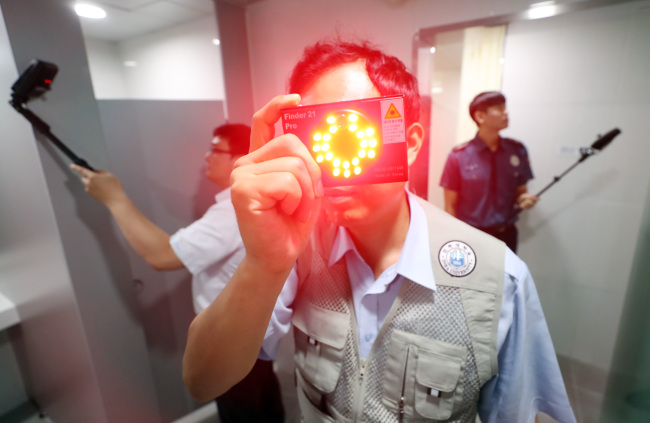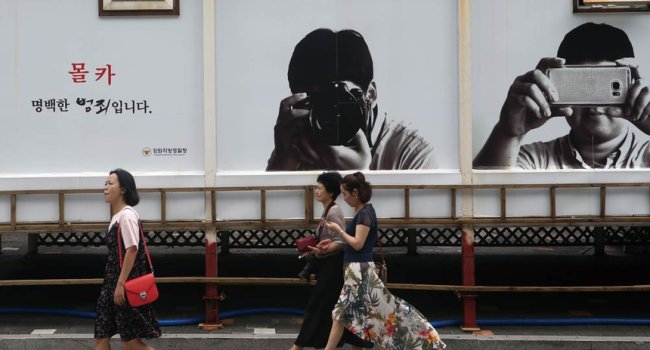Actress Shin Se-kyung and Yoon Bo-mi of Apink made headlines this week after a spycam was found in their room during the shooting of the new variety show “Borderless Food Cart” abroad.
The production team said the hidden camera in the shape of a battery charger was installed by a male staff member and that the suspect is currently being investigated.

Actress Shin Se-kyung (pictured left) and Apink’s Yoon Bo-mi. (Yonhap)
While the man who installed the camera “out of curiosity” failed to record anything explicit, according to the show’s channel Olive, the news that celebrities were targeted in a spycam crime fueled debate over spycams in South Korea.
In 2017 alone, a total of 6,465 crimes involving hidden cameras were reported, according to police. The figure comes down to nearly 18 incidents per day.
Internet commentators soon erupted in anger over the lack of information on the subject and the production team’s branding of the crime as “deviation.”
“Make the criminal’s name and face known,” one Naver user demanded.
“Deviation? That’s not right. He must have planned it all along from Korea instead of buying the hidden camera abroad. Make sure you punish the vicious criminal,” another commentator wrote.

Police officers and university officials search for spycams in a female shower room at Inha University (Yonhap)
Such angry reactions come as the country continues to grapple with a growing number of spycam crimes.
Around 5,200 criminal incidents involving spycams were reported in 2016. The figure soared over 20 percent the following year.
As the management of the show has decided not to reveal any information on the suspect, apart from his gender, a women’s rights expert says the suspect’s personal information is unlikely to be made available, given the country’s strict defamation law
“It is a little hard to say the suspect’s personal information will be shared in the case of actress Shin Se-kyung, as the man only installed a hidden camera without having managed to film anything successfully,” said Byun Hea-Joung, the head of the Women’s Human Rights Institute of Korea.
Though sex offenders are registered in South Korea, the general public are often not granted access to the records, with the exception of employers for the purpose of background checks when jobs require working with children.

A sign reads, “Molka (spycam crime) is a downright crime.” (Yonhap)
Byun says spycam criminals should face tougher punishments.
“Though we have yet to decide whether to disclose personal information on spycam criminals or have them face tougher sentencing, the law needs to be tougher, as well as the legal process,” Byun said.
Yoon Deuk-kyoung, a researcher at the Korea Women’s Development Institute, voiced a similar opinion. “(The law) needs to be tougher. If personal information is forced to be disclosed, it will lead to more alertness” Yoon said.
By Yim Hyun-su (
hyunsu@heraldcorp.com)



![[Exclusive] Korean military set to ban iPhones over 'security' concerns](http://res.heraldm.com/phpwas/restmb_idxmake.php?idx=645&simg=/content/image/2024/04/23/20240423050599_0.jpg&u=20240423183955)




![[Herald Interview] 'Amid aging population, Korea to invite more young professionals from overseas'](http://res.heraldm.com/phpwas/restmb_idxmake.php?idx=645&simg=/content/image/2024/04/24/20240424050844_0.jpg&u=20240424200058)